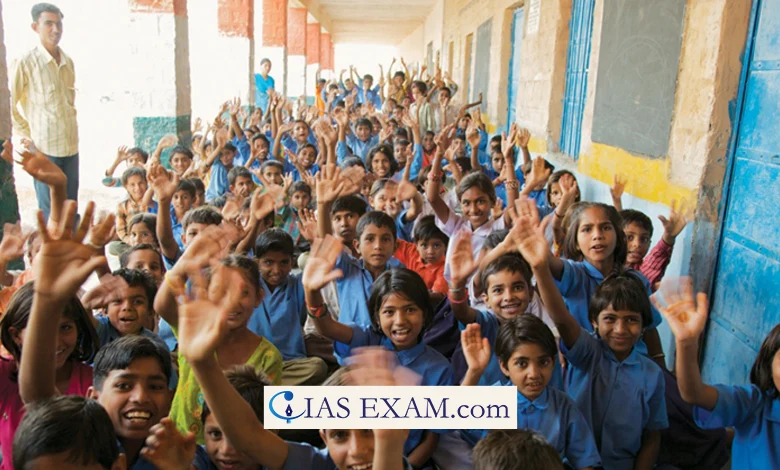Early Mother Tongue Education
Syllabus: Issues related to Education[GS Paper-2]

Context
Teaching children in their mother tongue from the early stages is crucial for their cognitive, social, and emotional development. It helps them develop a strong foundation in language and literacy skills, leading to better academic performance and a deeper understanding of their cultural heritage.
Key Points
- Instruction in Mother Tongue:
-
-
- The CBSE circular, dated May 7, 2024, aligns with the National Education Policy 2020 and the National Curriculum Framework 2022.
- It emphasises teaching and learning in the child’s mother tongue or regional and local language.
- Schools are encouraged to use educational material that focuses on learning in one’s mother tongue.
- This approach aims to enhance language skills and comprehension for students.
-
- Entry-Level Primers:
-
- In order to enrich linguistic diversity, NCERT and IIL have formed an alliance, namely the National Council for Educational Research and Training and the Indian Institute of Languages.
- They have produced a series of 52 entry-level primers tailored to various mother tongues and local languages spoken across India.
- These primers serve as basal readers and introduce numerals to children in balvatikas (early childhood centres) and anganwadis (childcare centres).
- Languages such as Bhutia, Bodo, Garo, Khandeshi, Kinnauri, Kuki, Manipuri, Nepali, Sherpa, and Tulu are covered.
Significance of Mother Tongue Education
Teaching children in their mother tongue has numerous benefits, including:
- Improved language skills and literacy
- Better academic performance and understanding of complex concepts
- Preservation of cultural heritage and promotion of cultural diversity
- Increased confidence and comfort in the educational environment
- Reduced dropout rates and improved educational outcomes
Benefits of Mother Tongue Education
- Improved Language Skills: Children who are learning their mother tongue will often have very good skills in reading, writing and speaking.
- Better Academic Performance: Mother tongue education is the best in the academic performance as the kids will understand the concepts even more complexly.
- Cultural Preservation: Children are able to grasp maternal language easily, which helps to maintain their cultural heritage and promote cultural diversity.
- Increased Confidence: Students who are taught in their mother tongue natively feel more confident and comfortable in the learning environment. It helps students believe in their abilities and leads to deeper engagement with the learning process.
- Reduced Dropout Rates: A curriculum in the mother tongue has a substantial proportion of students staying within the school environment, keeping them excited and motivated to learn.
Challenges in Implementing Mother Tongue Education
- Lack of Resources: Having in mind the fact that the educational institutions may not possess sufficient resources to offer native tongue education accompanied by the lack of specially trained teachers a lot of difficulties may arise.
- Diverse Language Backgrounds: English occupies a dominating position in schools throughout the country with minor linguistic groups declining in their native languages.
- Socio-Linguistic Complexities: Socio-linguistic complications may also be present as part of this process, like using the socio-linguistic mapping. This aids in understanding the language context in schools or classrooms.
- On the other hand, there are still some issues to tackle, such as reaching a wide range of private teachers who have the ability to teach in a multilingual environment.
- These locals serve as an invaluable tool for imparting instructions to the preschool aged children aged 3-8 years using their native language at the basic level.
Recent Initiatives and Achievements
- CBSE’s Initiative: The Central Board of Secondary Education (CBSE) calls schools to make educational products targeted at learning in the mother tongue and the promotion of multilingual education.
- UNICEF’s Multilingual Education Programs: One of the UNICEF programs concerns multilingual education, whereby the tribal languages are used to cover material in a pilot program in Jharkhand initiated for primary children.
- Chhattisgarh’s Language Mapping: Chhattisgarh has devised an exercise on language mapping for that purpose also whereby children speak in different languages and materials and their content of the same – is prepared in these languages.
Conclusion
Teaching children in their mother tongue from the early stages is essential for their cognitive, social, and emotional development. While there are challenges in implementing mother tongue education, recent initiatives and success stories demonstrate its potential to improve academic performance, preserve cultural heritage, and promote cultural diversity. By prioritising mother tongue education, we can create a more inclusive and effective education system that supports the development of all children.
Source: The Hindu
UPSC Mains Practice Question
Q. Why is it crucial to prioritise teaching children in their mother tongue from the early stages of education?





.png)



